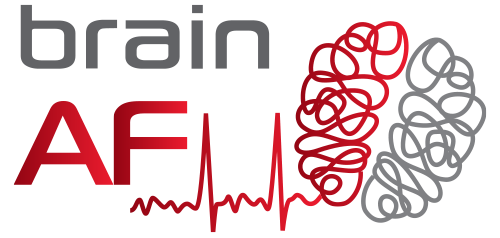BRAIN-AF clinical trial
Helping the brain by treating the heart
Researchers at the Montreal Heart Institute are currently conducting the world’s first study aimed at demonstrating the link between anticoagulant therapy and the prevention of cognitive decline in young patients with atrial fibrillation, a common type of heart rhythm disorder.
If you or a loved one have atrial fibrillation and are between the ages of 30 and 62, you may be eligible to take part in the BRAIN-AF study. Find out more!
To better understand the link between the heart and the brain
The BRAIN-AF clinical trial

Atrial fibrillation is a type of heart rhythm disorder that affects about 700,000 people across Canada, 25% of whom are under 65 years old (approximately 175,000 people). In patients with atrial fibrillation, the annual risk of stroke is 0.7% in those at low risk and 18% in those at high risk, whether or not other factors such as diabetes, high blood pressure, and medical history are present. In addition, several scientific studies have confirmed the link between atrial fibrillation and the decline of brain functions, such as memory, comprehension, reasoning, and attention.
To reduce these risks, Canadian guidelines recommend anticoagulant therapy (blood-thinning medication) for people with atrial fibrillation over the age of 65 or for those at a high-to-moderate risk of stroke. As for people at low risk of stroke, the same guidelines do not recommend treatment. The study, therefore, aims to determine how to treat the heart while also helping the brain of younger patients.
Clinical trial description
Taking place in close to forty Canadian centres, BRAIN-AF is a clinical study initiated by the Montreal Heart Institute and funded by the Canadian Institutes of Health Research (CIHR), among others. This study will enroll 2,180 eligible people, with over 900 participants already involved in the study to date. Participants will be randomly assigned to two groups: one will receive the anticoagulant (rivaroxaban), while the other will be given an identical product that does not contain active ingredients (placebo). This will allow researchers to determine whether it is preferable for patients to take an anticoagulant or to receive no treatment. Additionally, neither the research team nor the participant will know which treatment was administered.

Goal of this study
The primary goal of this study is to compare the efficiency and safety of an anticoagulant (rivaroxaban) with the standard treatment to reduce strokes and cognitive deficits in subjects with atrial fibrillation who are at low risk of stroke.
A reduced dose of rivaroxaban (15 mg per day) compared with that administered to patients at higher risk of stroke (20 mg per day) will be used in this study.
By using this drug to treat atrial fibrillation, researchers also hope to validate if this treatment can have a preventive effect on cognitive decline and dementia in young patients suffering from this condition.
Main eligibility criteria
› Be diagnosed with atrial fibrillation
› Be between 30 and 62 years of age
› Have no history of hypertension, diabetes, stroke, or heart failure.
Participant involvement
› Baseline visit at a study-affiliated centre to determine eligibility and establish base data (2 hours)
› Daily intake of medication or placebo
› Follow-up at an affiliated centre or by videoconference (or telephone) every six (6) months (15–45 minutes)
› Participants will have ongoing access to a medical team to answer questions
› Visit can be conducted remotely, either by videoconference or by phone. In this case, the medication will be sent to your home by mail. Participants will have ongoing access to a medical team to answer questions.
Pharmacogenomics and Biomarkers Substudy
A sub-study that analyzes pharmacogenomics (DNA) and biomarkers (blood biomarkers), some of which are considered risk factors for stroke and dementia, is also ongoing for patients participating in the main BRAIN-AF study. Participation in this sub-study is optional and does not affect participation in the main study.
Pharmacogenomics (DNA) and biomarkers (blood biomarker) analyses are considered precision medicine research; they are intended to allow for the prescription or development of treatments and more targeted disease prevention according to certain individuals’ genetic and biological profile.
Dr. Jean-Claude Tardif, director of the MHI research center, and the MHI have received funding from the Fonds d’accélération des collaborations en santé (FACS) of the Government of Quebec to carry out this sub-study.
The MHI’s Pharmacogenomics Center will carry out the analyses.
